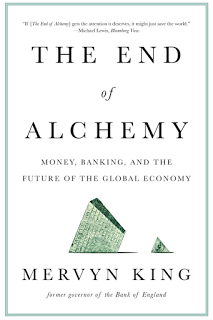I finished reading The End of Alchemy: Banking, the Global Economy and the Future of Money and came away with some useful but simple insights on the current state of finance by the author Melvyn King. This is not just another Financial Crisis book but the views of one of the thought leaders within the Bank of England during this critical time. It describes many of the current problems with banking today, but it really focuses thinking about the aftermath of the crisis into three areas, disequilibrium, radical uncertainty, and trust.
- Disequilibrium exists in the post-crisis financial world and monetary policy through lower rates may not be enough to eliminate the problem. In fact, low rates may create new disequilibriums. Without thoughtful policy, economic growth and bank safety may be stuck in a poor state. There may be needed shock policy to get us to a new stable equilibrium state.
- Radical uncertainty continues to exist and stops investment and consumer decisions from being made. Radical uncertainty is further fostered when new policies are tried which are disruptive to past policy behavior. Strong growth in investments cannot be expected in a highly uncertainty environment.
- Trust in the current financial world is paramount to generating a stable economic and financial environment. Changing levels of trust leads to bank runs, cautious investment behavior, and poor response to policy initiatives. In a highly levered financial world, trust is critically important to a smooth and effective financial system.
Of course, there is much more to this book, but the three themes of disequilibrium, uncertainty, and trusts are drivers that pervade all of the other think gin about policy and the economic response of the markets, consumers, and investors.
In this world, why would we expect that the same forms of fundamental thinking would work for investors? Following market prices would not seem irrational in this world.

